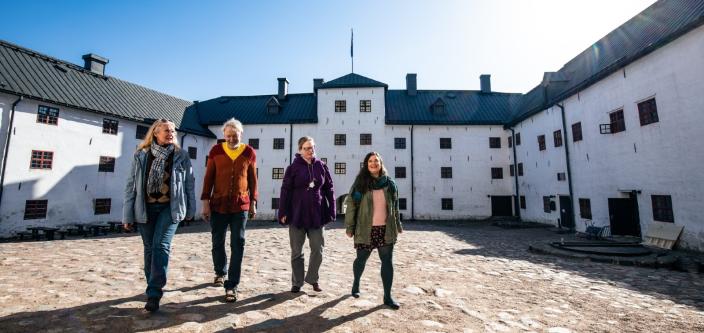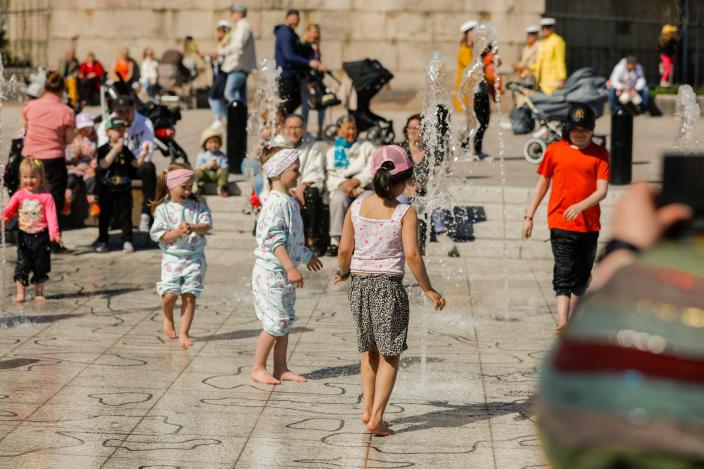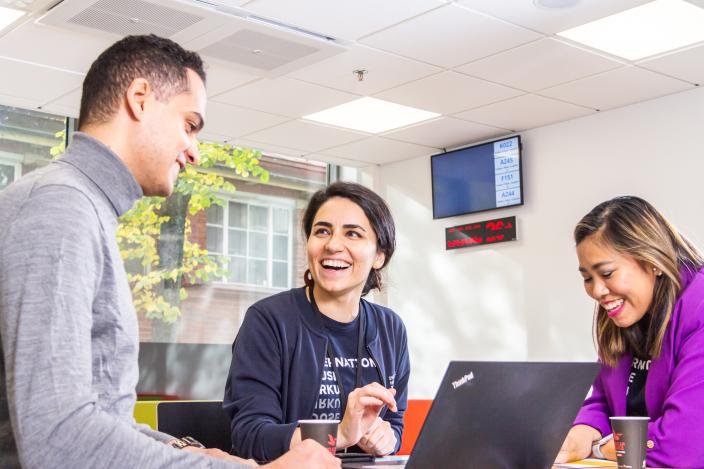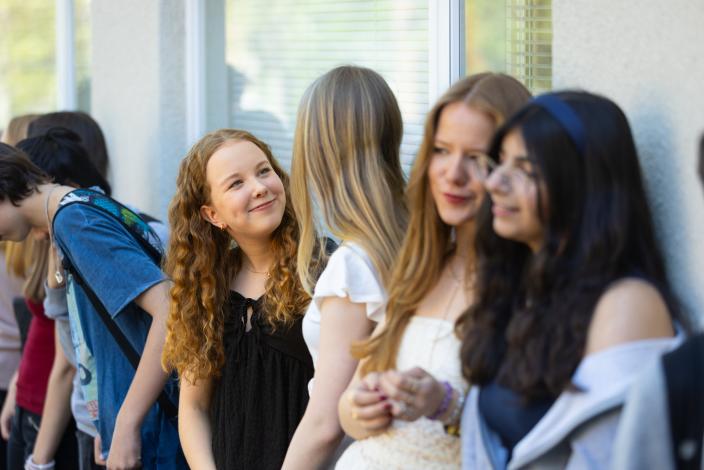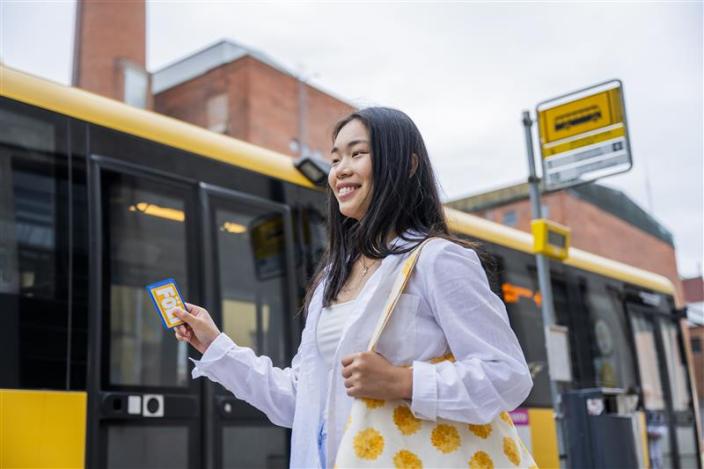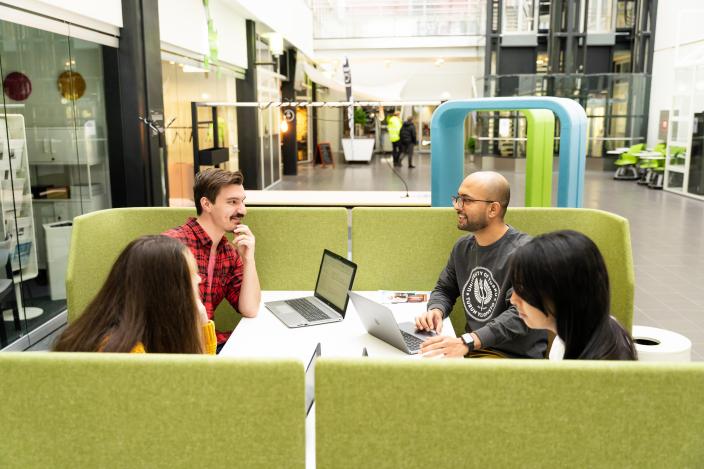Preface
Turku – 800 years of growth and human stories. A city that respects the past and bears responsibility for the future. And a city where people look you in the eye, smile and ask you how you’re doing. This is Turku, the oldest city in Finland, celebrating its 800th anniversary in 2029.
Its long history abounds with stories from the banks of Aura River, the culture, the cityscape and local communities. At the same time, that history calls us to build an even stronger, more sustainable and more humane future for everyone in Turku.
The strength of our city lies in its people. Turku is a place where everyone can grow, learn, study, work, do business, love and live a good life – regardless of their language, background or age. We are a proudly bilingual city where Finnish- and Swedish-speaking communities enrich each other’s lives. We are also an international city that welcomes newcomers and builds a shared future, finding strength in diversity.
This Mayor’s Programme, “Turku into the New Century”, is a common guideline that will help us ensure that Turku grows wisely, fairly and sustainably. Our goal is to build a city that is functioning and flourishing – in all neighbourhoods, at all stages of life and for all its residents.
How we anticipate and react to future population growth is crucial. As the population grows, we have to make investments in the service network, mobility and a skilled and prosperous future, while ensuring a sustainable economy and environment.
The programme revolves around humanity. A strong economy enables high-quality services, but even so, people need to be heard and included and feel safe in everyday life. We want a city where everyone can feel like they belong and that they can influence the development of their city.
Turku is moving towards its next century with determination, building the future together. This programme is both a hope and a promise of working together, listening and finding solutions. Nearing our big anniversary, we are not just looking back, we are facing the future with a bold smile. The new century is waiting, let’s get there together.
Now, forever, Turku.
Piia Elo
Mayor of Turku
1. A sustainable economy safeguards well-being and vitality
Economy in Turku is managed responsibly in a way that supports future growth and vitality and secures services. Sustainable financial management is supported by investing in preventive services and competence; investing in the future.
In many respects, strengthening the city’s sustainable economy and internal financing is above all dependent on the city’s own operations. Revenue from municipal, property and corporate taxes is by far the most significant source of income for the city. We are primarily strengthening the economy with an active employment and growth policy that supports the tax base and increases other returns. Turku aims for growth in the employment rate and a significant increase in the number of construction projects to strengthen the income base, while supporting a change in the economic structure that produces positive spill-over effects.
To enable investments that support the growth and vitality of the city, such as the construction of schools, day-care centres and sports facilities, the debt of the City Group and the parent city can be increased in a controlled manner. The total debt of the City Group is continuously compared with Finnish reference cities, ensuring that the state of debt in Turku does not deviate significantly from other large cities.
The City Group’s companies play an important role in producing added value for the city, and their opportunities as part of the Group’s creation of sustainable growth are safeguarded. Achieving objectives without inappropriate partial optimisations is ensured through good ownership policy and dialogue. Updating the ownership policy will involve assessing the possibilities of growing shareholder value.
Local government finances will be undergoing changes in the next few years due to the reform of the central government transfers system. Turku must contribute to ensuring that the challenges of growing cities are taken into account and that their investment capacity is supported. There are also major uncertainties related to Finland’s economy and global economic development at the moment. This is why the economic framework will be assessed in its entirety in 2027 in the midterm review of the Mayor’s Programme period. The aim is that the economic framework and its debt ceiling and tax entries will be maintained for the entire council term 2025–2029. Updates to the midterm review will be made in relation to operational objectives, economic realisation, forecasts the economic cycle.
A strong economy is a prerequisite for achieving the objectives set out in this programme. In the programme, sustainable financial management and sensible structural and operational reforms as well as timely and accessible services support the efficiency of operations.
Operations and management must be efficient. The city runs on knowledge-based management. The monitoring and impact assessment of changes is based on data. Turku is preparing to utilise the potential of artificial intelligence in its operations. When used correctly and responsibly, artificial intelligence can support the accessibility of services, make administration and routines more efficient, improve the customer experience and help to allocate resources more efficiently.
In building the future, the most important resource of the City of Turku is its personnel, whose wellbeing is a target of investment. The city’s employer policy must be based on trust, openness and equality. Good leadership and employees’ ability to influence their work contributes to employees’ improved coping and well-being and makes any open positions more attractive. In Turku, supplementing personnel competence is especially targeted at sectors with labour shortages, such as early childhood education and care.
The economy in Turku is managed in a sustainable manner, ensuring well-being and the provision of services. A sustainable economic framework consists of four points:
- A baseline for a sustainable economy
- Debt ceiling
- Procedures for sudden emergency situations
- Tax policy
A controlled expenditure increase is the basis for economic sustainability. Expenditure may increase as a result of general population growth and in line with the price index, but economic sustainability requires for the operating costs to increase at a slower pace than the tax revenue in the medium term.
The average change in the planning framework for operating expenses in 2026–2029 is +3.0%. This change responds to a change in the cost level, the changed number of 0–18-year-olds and, primarily, the increase in the need for services for children and young people.
The city must continue to improve its financial position and investment capacity. The quality of service production must be improved in a cost-neutral manner at the city level.
The focus is particularly on promoting measures and investments that can lead to improved productivity or increased revenue or to curbing the development of operating costs. The growth of the operating expenditure is primarily curbed by improving productivity through structural reforms without weakening the service level. The implementation of the decided adjustment programme is monitored, and the programme will be updated if necessary.
The development of operating costs and the economic framework will be assessed in 2027.
In the coming years, Turku will have major investment needs due to population growth and a significant reduction of the repair backlog. Investments are a tool for developing urban structure, improving employment and vitality, and renewing and optimising the location network of basic services, which will also generate cost savings. In the implementation of investments, considerations include their timing, economic efficiency and profitability.
The adjusted loan portfolio of the city’s parent organisation (loan portfolio – lending = adjusted loan portfolio) may not exceed EUR 7,200 per resident at the end of 2029. The real estate company loans that are under the city’s financial liability are included in the adjusted loan portfolio.
The forecast for the incurring of debt is based on identified investment needs and the historical realisation rate of investment programmes. The objective includes the assumption of investments partially stretching beyond the programming period.
The monitoring of the city’s incurring debt and liabilities will also be developed by including a key figure that shows not only the adjusted loan portfolio but also the rental and leasing liabilities. In addition, debt developments will also be compared annually between large cities at the Group level when preparing the financial statements.
The maximum limit for the debt ceiling will be assessed in the midterm review of the Mayor’s Programme period in 2027.
If the expected economic development differs significantly from the baseline in terms of expenditure or income, separate measures need to be taken to improve financial sustainability. The most significant risk is a significant drop in tax revenue.
If the annual margin stated in the financial forecast becomes negative or the accumulated surpluses fall below EUR 100 million during the contract period, separate adjustment measures will be taken to restore the annual margin so that it is at a sustainable level and on the same level as the amount of depreciation. The transitional period for these procedures is up to two years.
The objective is to strengthen the tax base in Turku by improving the employment rate and increasing vitality. As a premise, Turku will avoid raising the municipal tax.
The midterm review of the finances of the Mayor’s Programme period in 2027 will include assessing the adequacy of tax revenue, central government transfers and financial income for economic equilibrium during the financial plan period.
2. Healthy and equal in Turku
Everyone living in Turku or moving to Turku for work, studies, safety or love must be able to feel like Turku is their home and that they are fully-fledged citizens of Turku. The experience of inclusion and equal treatment is one of the most important prerequisites for a good life. Turku is determinedly investing in increasing communality, encountering people, understanding each other and reducing loneliness.
Communality is created in everyday life through encounters, safe spaces and opportunities for participation. Cooperation with organisations and other communities plays an important role in promoting the well-being of city residents.
The future of Turku is hinged on the well-being, self-confidence and motivation of children and young people. Everyone has the right to a safe everyday life that enables physical, psychological and social well-being. School, leisure time and support from family lay the foundation of a good life for a child.
Measures:
- Increasing club and hobby activities for children and young people in connection with school days
- Adding more optional subject paths and weighted-curriculum education in local schools
- Ensuring sufficient early-stage support for multilingual children and children coming to Turku from other cultures
- Improving awareness of recreational vouchers especially among vulnerable families to promote children’s hobbies in cooperation with the wellbeing services county, and raising awareness of the recreational voucher among families with multilingual children
Services aimed at young people support the well-being, inclusion and equal opportunities of young people. Such services help prevent exclusion, promote good mental health and provide safe meeting places in different life situations. By investing in young people, the city invests in its future – residents who are active, responsible and healthy.
Measures:
- Continuing the youth work reform and pilots in outreach youth work
- Investing in outreach youth work and school youth work, making said services accessible
In Turku, well-being is for all generations, which is why it is necessary to ensure that everyone gets the opportunity and has the ability to be physically active to maintain their health. Hobbies also promote inclusion, which is why Turku ensures that every child and young person can engage in hobbies, feel that they belong and receive support for their growth.
High-quality local sports facilities, such as sports fields, workout stairs, artificial ice rinks and outdoor gyms, are available around the city. The yards of schools and day-care centres are developed to encourage residents to be physically active even after school hours.
To support older people’s functional capacity and well-being, opportunities for physical activity and recreational activities will be increased in cooperation with organisations and the wellbeing services county.
The objectives of the ‘Turku makes everyone move’ model will be promoted while encouraging other municipalities in the region to join the model as well.
Measures:
- Encouraging children to engage in physical activity with the help of stimulating yards at schools and day-care centres and local sports facilities and by increasing physical activity during day-care and school days for children and young people.
- Finding ways to promote the functional capacity and well-being of older people by increasing physical activity and recreational activities in cooperation with the wellbeing services county and the third sector
- Implementing an investment package for sports facilities on the basis of the development policies approved in spring 2024.
- Examining the effectiveness of the Boostii model and updating the model in 2026 to ensure that the cost level of children’s hobbies is not growing and that the other objectives of the reform are being achieved. Further updating the model in cooperation with clubs, which will safeguard club activities and the prerequisites for children’s and young people’s hobbies in particular. If necessary, securing subsidies for club activities.
Culture holds robust potential for vitality, and the city’s 800th anniversary offers a unique opportunity to internationally highlight Turku’s bilingual urban culture that culminates in the maritime, diversity and good food. Culture makes the city more appealing, attracts tourists and creates jobs.
Turku will continue to be profiled as a city of culture, boldly creating something new, engaging all Turku residents and upholding the Cultural Promise. Cultural services are developed with the principle of “culture belongs to everyone”. Low-threshold cultural activities will be extended to suburbs, and content aimed at various groups, including low-income people, will also be reinforced. Cooperation between cultural actors and educational institutions and day-care centres will be increased. The role of libraries as promoters of literacy and education and as pillars of culture and communality is recognised.
Measures:
Developing the Cultural Riverbank and the Art House concepts and supporting the accessibility of culture.
- Utilising the new opportunities offered by Music Hall Fuuga and the City Theatre as extensively as possible for various cultural and musical activities and events.
- Ensuring operating conditions for professional artists.
- Investigating the expansion of basic education in the arts.
- Investigating the expansion of the Boostii model beyond physical activity to other types of guided hobbies for children and young people.
3. Turku promotes regional equality and dismantles segregation
Turku is the most segregated city in Finland. The segregation of residential areas affects schools, the attractiveness of residential areas, socio-economic structure and well-being. The development of segregation cannot be resolved with individual measures; it will be the sum of several measures. The reduction of segregation must be managed as an overarching theme even if individual measures are taken in all operations.
In Turku, everyone must have the opportunity to live a good life regardless of where in the city their home is. Having access to schools, day-care centres, a pleasant and safe living environment and local sports facilities belongs to all residential areas. Turku is developing diverse, safe and vibrant residential areas that all undergo market-based and versatile housing development.
The city’s facilities will be increasingly used as open and accessible community facilities, especially in areas where loneliness and segregation are growing phenomena. Multilingualism and accessibility are key principles for strengthening a sense of community in the city.
Measures:
- Continuing the development of the School as a Platform concept to increase regional communality.
- Increasing cooperation with organisations and offering active and accessible youth activities in different parts of the city.
- Establishing community spaces for residents and associations in Varissuo and Halinen. Securing the operation of existing Local Living Rooms.
- Using the city’s grant principles to ensure that organisations’ opportunities for cooperation with the city are realised appropriately.
- Creating public meeting places in different areas of the city, such as outdoor playing fields, outdoor gyms and year-round non-commercial facilities, taking into account the reform of the school and day-care centre network and resident budgeting.
In Turku, every residential area is a good one, and the city-level housing and land use policy promotes diverse housing throughout the city for different age groups and city residents in different life situations. The segregation of residential areas is dismantled through housing policy, land use and sustainable urban mobility. The special features of residential areas must be better observed in the development of the service network.
In Turku, the school of each residential area is a good one, and the prevention and dismantling of school segregation ensures that every child has the opportunity to grow and receive an education. The upcoming regional division model will promote equality between schools and regions and feature more closely targeted regional measures to build a safe and prosperous future for each child and young person.
Measures:
- Resolving the situation with the Pansio school. Including additional facilities for other services in the renovation option, for example youth and resident activities.
- Resolving the situation for Varissuo pupils with a single school model in cooperation with the university.
- Strengthening funding for positive discrimination in schools.
- Reducing school segregation with knowledge-based management by investing in human-centred impact calculation measures.
The experience of inclusion, equality and equal treatment is a key foundation for a good life. We listen to residents, encounter them and offer ways to be involved in and influence decision-making through influencing bodies, citizens’ panels and resident budgeting.
In Turku, safety is based on encountering people and resolving the root causes of insecurity, not setting up walls. Turku is determined to invest in communality, human encounters and mutual understanding.
Measures:
- Strengthening cooperation between the public, private and third sectors through partnership agreements.
- Engaging residents while taking different language groups into account. The city’s communications are bilingual. Developing multilingual, plain language and English-speaking communications and ensuring an adequate level of accessible communication.
- Developing and resourcing resident budgeting to increase inclusion.
In Turku, everyone has the right to have their own home. Turku is committed to halving homelessness by 2027. Measures to reduce homelessness are taken not only at the city level but also in close cooperation with the wellbeing services county of Southwest Finland. Turku combats poverty and social challenges with versatile and goal-oriented methods.
Measures:
- Updating the action plan to prevent and reduce social exclusion and disadvantage in the city.
- Continuing cooperation with communities engaged in food distribution.
- Continuing cooperation with the wellbeing services county of Southwest Finland to reduce homelessness. Continuing the activities of the cooperation network aiming at eliminating homelessness.
4. Education, competence and employment into the new century
The city’s task is to ensure the well-being of its residents and the vitality of the city. To safeguard well-being and vitality, the city must ensure that all our children have the opportunity to grow into experts who enjoy good well-being and that our young people have the opportunity to become adults who are fit for work.
Turku is a city where everyone can strive for the best possible future for themselves. Everyone has the right to learn in a safe environment that supports growth, inclusion and happiness. Turku must be a place where people are comfortable as employees, entrepreneurs and employers. Work increases well-being and guarantees livelihood and the opportunity to develop.
In the learning path of child or a young person, safety is created by the people around them: school and day-care centre staff and family and friends. Similarly, safety is created by the physical environment: indoor spaces, classrooms, corridors and yards. These themes emerged in the Competent and Learning Turku learning path report. In line with these themes, measures will be set up in Turku to support growth and learning. An especial focus will be on literacy and strengthening basic skills, the role of personnel, and safety.
Reducing group sizes and increasing the number of adults encountering children and young people enable children to learn and give adults the opportunity to work in peace.
Sufficient contact teaching is ensured in vocational education and training as well as in general upper secondary education, and adequate support measures are used to support the students’ progress in their studies, their coping and their mental health. Secondary education in Turku is free of charge for persons of compulsory education age in all situations.
Turku offers versatile education, and the network of educational institutions supports everyone’s path to becoming an expert. Turku has a strong field of education, ranging from basic education to upper secondary education and further to higher education studies, and the possibility of lifelong education to meet the needs of business and industry.
Turku is a genuinely bilingual city where bilingualism is recognised as a strength and resource.
Measures:
- Establishing a multiprofessional day-care centre for traineeships in early childhood education and care.
- Drawing up a programme of measures to improve the availability and permanence of early childhood education and care staff throughout the city.
- Increasing the number of teaching hours in basic education to the level of other large cities.
- Reinforcing the literacy of all children and supporting language learning among young people with an immigrant background.
- Committing to reducing group sizes in basic education and ensuring sufficient support.
- Ensuring a safe journey to the local school.
- Enhancing communality and student welfare in schools as part of promoting the well-being of children and young people in cooperation with the wellbeing services county of Southwest Finland.
- Introducing an anti-bullying plan.
- Increasing facilities at Turku upper secondary schools to ensure the good quality of upper secondary education and a sufficient number of student places.
- Launching preparations for starting English-speaking general upper secondary education.
- Ensuring the smooth launch of the Taito campus.
- Launching the implementation of the campus for vocational education and training in technological industries.
Turku will become the best at promoting employment in Finland by the end of the council term. Indicators will be set for this objective in cooperation with stakeholders, and their implementation will be monitored annually together with companies, organisations and city residents.
The aim is to provide fast and individual services for jobseekers and employers alike. Employment services are part of the city’s vitality work and are closely connected to the business services offered by the city.
Measures:
- Drawing up an action plan to promote the employment of people in a challenging labour market position and people with partial work ability.
- Implementing operational cooperation between vocational education and training and employment services.
- Developing business development services and services for new entrepreneurs and further streamlining permit processes. Offering advice services to start-up entrepreneurs in several languages.
- Examining the preconditions for establishing a social enterprise and the role of the city in it, and creating a model to support associations in promoting employment.
Promoting and supporting entrepreneurship is an important part of effective employment and business services. Turku needs viable companies, jobs, innovations and investments. The city ensures clear and timely business services and contributes to the sufficient availability of skilled labour. The process of starting a business needs to be as seamless as possible in Turku.
Measures:
- Ensuring smooth and timely business services by defining a clear service promise for companies, including seamless permit services, service concepts and schedules.
- Offering advice services to start-up entrepreneurs in several languages.
- Companies’ placement in Turku is supported with active dialogue and an adequate and appropriate offering of plots and facilities.
- Making it possible for even small businesses to participate in competitive tendering in city procurements.
The best models for promoting integration will be created in Turku. Integration and language learning services must be quickly available, of high quality, impactful, and take different starting points into account. Language learning is a prerequisite for finding employment as quickly as possible and for attachment to Finnish society.
Women – especially mothers – play a key role in integration. When women are actively involved in the integration process, it supports the well-being and societal inclusion of the entire family. Mothers are often the first educators of their children and the most important in safeguarding their children’s everyday life – when they receive information, language skills and support, their children and the rest of the family will also integrate quicker and more strongly. For this reason, integration measures need to reach women in a genuine and equal manner.
Measures:
- Making an effort to increase the participation rate of children with an immigrant background in early childhood education and care.
- Monitoring and assessing the quality of preparatory education.
- Evaluating the services targeted at immigrants to increase their impact and efficiency.
- Utilising integration services as soon as possible, with an emphasis on language training and integration that supports employment skills. Undoing the backlog of language training.
- Using physical activity particularly targeted at immigrant women and children as a means of promoting integration.
- Improving the identification of immigrants’ competence to promote employment.
- Strengthening cooperation with immigrant organisations and religious communities to promote integration.
- Turku leads the way by hiring multilingual personnel.
5. Housing, land use and mobility as a basis for a sustainable and developing city
Sustainable urban development promotes the city’s climate objectives, comfort and housing quality as well as city residents’ well-being. In Turku, urban development includes nature and nearby forests – also within the urban structure.
The targeting of urban development will be strengthened in the growth corridor area between Varissuo and the port. The growth corridor aims for social balance between regions, and it must take into account housing, workplaces, the service network and tourist attractions and a sustainable city with a smoothly operating everyday life in general.
To attract investments and ensure a functional everyday life in the rapidly growing areas of Kupittaa and Itäharju, it is ensured that the education and business cluster is well-functioning. A pleasant and dense urban space and good mobility and traffic will remain at the centre of regional development.
Companies’ placement in Turku is supported with active dialogue and an adequate and appropriate offering of plots and facilities.
A sustainable urban structure promotes the city’s climate objectives, comfort and housing quality as well as city residents’ well-being. The city may be dense, but it needs to be pleasant, green and able to adapt to climate change. Turku bears great responsibility for slowing down climate change and combating biodiversity loss through its target of carbon neutrality and its biodiversity programme and through national and international cooperation to achieve wider impacts.
Measures:
- Implementing the visions of the Science Park and maritime Turku
- Drawing up an action plan for the development of the city centre for the duration of the council term, which includes approving the traffic plan for the city centre.
- Better accounting for the historical values of the city and the special features of the cultural environment in urban development.
- Preserving existing green urban areas when building new residential areas.
- Aiming to increase the number of green areas as part of a sustainable and attractive urban environment.
- Introducing the 3-30-300 target in zoning to increase comfort and greenery: the planning of new areas starts with the premise that at least three trees are visible from each window, the canopy cover is 30% and a green area is no more than 300 metres away.
Turku drives far-reaching and systematic housing policy. Urban development plans and land transfers are used to ensure the development of affordable housing to a good quantitative and qualitative extent for promoting the balanced development of residential areas and to prevent segregation.
Turku wants to use good services and a pleasant environment to attract families with children. There should be an effort to increase the number of family homes. During the forthcoming council term, the aim is to increase single-family house planning not only through supplementary construction but also with new residential areas.
Turku promotes diverse housing production by adding affordable housing to areas that are relatively lacking and aims to promote market-based housing in the most segregated residential areas. Diverse housing production must be ensured already at the beginning of an urban planning process.
Special groups are also taken into account in housing policy. Turku is an active partner in promoting housing for special groups, such as older people and people with disabilities. As a student city, Turku ensures that the city has enough housing for students.
Measures:
- Increasing the offering of plots for single-family houses.
- Increasing partnership planning in a controlled manner. Partnership planning is especially used to promote state-sponsored housing production by group entities.
- Dismantling segregation by means of land use and city planning.
Sustainable and easy mobility is one of the crucial issues in a growing city. It determines the functioning of the city, the achievement of emission reduction targets, the comfort of the urban space and traffic safety, and it impacts people’s health and inclusion. The city invests in the accessibility of mobility.
The reduction of transport emissions must be enhanced to achieve the carbon neutrality target.
The public transport in Turku must be reliable, affordable and functional for its users. Key services must be accessible to everyone via public transport connections. Users are consulted in the development of public transport. The public transport corridor between Varissuo and the port will be developed.
Measures:
- Promoting the launch of local train traffic in cooperation with other municipalities in the commuting area and taking the placement of potential local train stations into account in city planning.
- Monitoring the implementation of the measures in the sustainable urban mobility programme and securing its resources. Implementing and monitoring measures to promote a change in the distribution of modes of transport.
- Monitoring the success of the trunk line reform and carrying out an impact assessment on the reform, on the basis of which development will continue.
- Increasing park-and-ride facilities as a regional cooperation project to curb congestion in the urban area and to facilitate the use of public transport.
- Programming the implementation of the cycling target network 2035.
- Resolving the implementation of the travel centre.
- Making the potential tramway investment on the basis of comprehensive and accurate studies on the costs and impacts caused by construction and operation. Before launching the investment, a decision must be received about the financing share of the state (target 30%) in line with other tramway projects.
6. Turku – an ambitious city for climate and nature
Climate work at the city level is the foundation for climate action in Finland. The Turku carbon neutrality 2029 target will be adhered to, and there will be determined emission reductions in all sectors. Turku aims to become a nature-positive city.
Turku must promote the green transition through its own investments by utilising climate budgeting and by increasing its level of ambition. The continuity of investments requires a long-term political approach, a clear strategy and diverse partnership. The city must work with other regional municipalities to make the region more appealing to green transition actors and secure Finland’s most attractive investment environment, for example through permit processes and land use.
The main objective of climate policy in Turku is becoming a carbon neutral urban area by 2029. Turku is working to make the city’s operations climate positive by 2035.
While working to reduce emissions, Turku is preparing for climate change as comprehensively as possible, and the city will be developed to be more change-resilient.
Measures:
- Implementing the Turku carbon neutrality target 2029 and making emission reductions in all sectors.
- The Climate Plan sets out measures and indicators for achieving the carbon neutrality target. Monitoring the implementation of the plan annually with a climate report.
Protecting the Archipelago Sea is one of the priorities of the council term. As practical measures, Turku will continue regional cooperation in the Archipelago Sea programme and aim for sustainable implementation of the funding, effectiveness and scalability of the measures. Turku commits to taking the unique nature and biosphere of the archipelago into account in all related decisions. The strain on the Archipelago Sea must be reduced by utilising regional expertise and through the city’s own actions in cooperation with local municipalities, the Regional Council of Southwest Finland and the state. Turku promotes sustainable tourism in the Archipelago Sea as part of strengthening its vitality.
Measures:
- Enhancing stormwater filtration.
- Systematically reducing the nutrient load caused by land areas owned by the city.
- Besides voluntary measures, Turku aims to promote the protection of the Archipelago Sea with legislative amendments as well.
- Continuing the implementation of the Baltic Sea Operational Programme and reporting on its progress to decision-makers.
The decline in biodiversity is a global threat alongside climate change. Biodiversity loss can be prevented regionally by taking local habitats into account and protecting them.
Measures:
- Implementing the city’s LUMO programme for 2023–2029 and securing sufficient resources for its implementation.
- Establishing at least one new nature reserve in Turku during the council term as part of the LUMO programme.
- Preparing the next LUMO programme for 2030–2038 and linking it more strongly to all activities of the city.
7. Attractive and international Turku
Turku aims to be Finland’s most dynamic and customer-oriented business partner that generates sustainable growth and well-being. Turku needs viable companies, jobs, investments and innovations to grow. The economy of Turku hinges on a positively developing economy, successful management of employment, and business services. The city takes an active role in obtaining RDI funding for the region in cooperation with companies and higher education institutions.
The attraction and retention of international experts is increased by providing services comprehensively in English. Turku strengthens the “International House Turku” service model, which combines relocation services, language training, and support for employment for family members as well. We contribute actively to promoting skilled labour and education-based immigration to ensure that companies in the region meet their competence needs.
Turku holds a strategically important location in the Baltic Sea region and serves as a link between Finland and the other Nordic countries. The city’s bilingualism promotes cooperation with Nordic companies, higher education institutions and innovation ecosystems. Cooperation is strengthened while adding opportunities for new investments, innovations and business activities, which will improve and diversify Turku’s attractiveness and services.
Connections to the west are crucial both nationally and regionally. Turku promotes the West Railway as part of enabling more diverse connections to the west in Finland and is an active shareholder in the West Railway project company.
The climate work carried out by Turku is also part of its vitality policy. Being nature positive, reducing emissions and promoting the circular economy are measures that support sustainable growth and improve residents’ quality of life. The green transition creates new jobs and business opportunities while strengthening Turku’s position and image as an internationally responsible and attractive city.
Attractive and sustainable tourism strengthens Turku’s vitality. The nature and tourism values of the archipelago and, more broadly, the maritime environment are taken into account in urban planning and vitality work. Efforts to grow the potential of tourism must involve accessibility, emphasise the maritime dimension, create year-round interest and highlight food and restaurant culture. Interesting, timely and correctly channelled communications are essential. Tourism provides extensive multiplier effects to the region’s economy, supports the service sector and creates jobs.
Turku is moving towards the future side by side with its partners. Cooperation and partnership are important operating methods for Turku. The city collaborates continuously in everyday life with the municipalities of the region, the Regional Council of Southwest Finland, the joint municipal authority of the Turku urban region, the wellbeing services county of Southwest Finland, companies and business organisations as well as educational institutions and higher education institutions. At the national level, the closest partners of Turku are large cities. International cooperation is a natural framework for Turku where the city takes an active role.
Universities and universities of applied sciences are one of Turku’s most important resources, and the city is an active partner for higher education institutions and companies. Joint research and development projects must be promoted, and there must be improved opportunities for success in the competition for national and international funding.
The 800th anniversary of Turku in 2029 and the journey to that milestone will consist of a series of events spanning the entire year, permanently strengthening the vitality of the city and increasing Turku’s recognition nationally and internationally. The anniversary year will be fully utilised in the city’s marketing, for establishing attractiveness and for providing diverse cultural offerings. An assessment of the regional economic impacts of the anniversary year will be carried out.
Turku is a city where attractive major events are an essential part of vitality, regional development and tourism. The aim is to strengthen Turku’s position as a year-round event city that offers experiences for city residents and visitors alike.
The preconditions for promoting major event activities and national and international competitiveness are strengthened by systematically taking the needs of event organisers into account in city development, investments and infrastructure projects. Enabling events is part of the vitality policy in Turku, and the city actively supports the creation and growth of new and established events.
8. Principles of implementing the Mayor’s Programme
“Turku into the New Century” is the Mayor’s Programme for council term 2025–2029, jointly approved by groups to bind their activities and to steer political decision-making and the preparations for it. Each group signing the programme undertakes to comply with the objectives recorded in the programme and on all levels of decision-making. The decision-making bodies of all council groups committing to the programme and the organisations guiding the activities of the groups must approve and commit to the programme. As far as the budget is concerned, each group that signs it commits itself in its entirety to a shared, negotiated draft budget and acts accordingly also when deciding on the council’s budget.
The Mayor’s Programme is implemented and monitored through six programmes and sub-programmes defined under them. The work is steered by yet-to-be-established cooperative management groups chaired by members of the mayoral body. The work of the management groups will be regularly monitored by the mayoral body and in the committee of the chairs of the groups participating in the agreement group to ensure that the objectives of the Mayor’s Programme are progressing. The members of the cooperative management teams must be key decision-makers who are thoroughly familiar with the content of the programme and the objectives of political decision-making.
In the middle of the council term, in 2027, a mid-term review will be carried out to assess the development of the financial framework, meaning the development of operating expenditure, the maximum limit for the debt ceiling, and the adequacy of tax revenue, central government transfers and financial income for economic equilibrium during the financial plan period. In addition, the achievement of the other objectives of the programme will be monitored and the programme objectives elaborated if necessary.
The city’s advocacy objectives are defined by the City Board and their implementation is monitored annually.
Each group signing the programme undertakes to act in a manner that shows appreciation towards other groups and their members, both in connection with decision-making and elsewhere. All activities must comply with the anti-discrimination commitment and the principles of a safer space.
In conflict situations, we respect each other, and interaction between groups always strives for a constructive conversational culture. We resolve disagreements by discussing and listening to others.
Participation must be based on trust, which is why other participants must have the right to assess the trust of an individual group in the implementation of the programme and in cooperation. If a group or its member fails to comply with these rules and commitments, the group shall be deemed to have abandoned cooperation in promoting the Mayor’s Programme; in this case, their representatives are also not able to act in jointly negotiated positions of responsibility, such as the Deputy Mayor, the chairs or vice-chairs of bodies or members of cooperative management groups. Behaviour that is infringing on cooperation is identified and recorded in a shared meeting of the groups to ensure that the infringement has been identified and sufficiently discussed together.
The purpose of these principles is to ensure good and constructive cooperation between all parties committed to the agreement for the benefit of Turku and local residents.
9. Anti-discrimination commitment
- Turku does not allow any kind of racism or xenophobia, or discrimination or hate speech based on religion, disability, gender or sexual orientation. Racist or discriminatory acts are unambiguously unacceptable in decision-making.
- All the signatory groups undertake not to include any racist, xenophobic or otherwise discriminatory messages in their activities or communications. The groups will not take any action that conflict with the measures taken or decided by the City of Turku to promote equality and improve the status of minorities.
- The groups will take action towards members who publicly spread racist or discriminatory opinions. In such cases, the groups dissociate themselves from the actions of individual members.
- The groups joining the mayor’s agreement commit to promoting equality and anti-racist work in all decision-making bodies by dismantling racism in attitudes, activities and structures. The groups also publicly commit to promoting the equality and equal status and treatment of all people.

